Popular on Food52
Continue After Advertisement
12 Comments
Herschelian
May 4, 2015
I live in China, and my fave method with Mussels is, once cleaned etc (following all the excellent advice given by others here) I saute half a red onion which has been finely chopped, two fat cloves of garlic minced, add one stalk of lemongrass cut into 3 pieces - each piece 'bruised', then the mussels (approx 2lbs). Steam for five minutes, then add one can of coconut milk, one tomato which has been skinned and chopped, half a teaspoon of chilli and garlic sauce (or two seeded finely chopped fresh chillies), the juice of half a lime, half teaspoon salt, and 3 tablespoons of roughly chopped fresh coriander (cilantro). Cook for a further five mins. Serve in soup bowls with a big bowl to take the shells. Utterly delicious.
Gary B.
July 6, 2014
Yes, do not soak in fresh water for over 20 minutes.
I have a question. What about the use of black pepper while soaking clams? Does this lend to them sneezing out dirt?
I have a question. What about the use of black pepper while soaking clams? Does this lend to them sneezing out dirt?
whatshername
April 2, 2014
When I soak clams, I add corm meal to the salted water. The clams eat the corn meal and expel the waste.
Chris
December 4, 2013
Great article. Just a quick note on unopened mussels. Nick Ruello, an Australian fisheries biologist studied why mussels don't open when cooked, and found that mussels that don't open were safe to eat. Larousse Gastronomique also makes no mention of discarding unopened mussels. In my experience, mussels that are open when cooked are more likely to have been missed when cleaning and be dead, rather than closed mussels, which smell normal and are delicious. Let's stop perpetuating the myth!
Greenstuff
December 5, 2013
Old habits die hard, but in fact, Chris is right. I continue to toss the (few) unopened mussels, but that's for the practical reason--they aren't open--as well as being a victim of myth.
linded
July 8, 2013
I have to agree with Greenstuff about soaking. Saltwater shellfish will die in fresh water. You will have better shellfish if you scrub them with a brush under cold running water, then refrigerate uncovered until you cook them. If you have fresh cold seawater, that is the best medium for holding your shellfish. Once out of seawater, the shellfish are stressed and need to be cooked as soon as possible. They will not eat cornmeal or anything else while stressed.
rdj120
June 16, 2013
To help clean mussels and clams, pour some corn meal in the bucket. They will ingest it and expel the sand in their guts.
nowarmsoda
June 14, 2013
Totally agree with Greenstuff, salt water is much better for soaking and making them spiting out grit.
Greenstuff
June 13, 2013
Good topic! Clams and mussels are delicious and often affordable. A couple more tips--don't store them in a plastic bag, they'll suffocate. The best fish markets don't even send mussels home in plastic bags. If mine are bagged, I get them out immediately, keep them in a bowl in the refrigerator, and cook them the same night. Most clams are a little hardier. If you have to keep them overnight, put them on top of, not in, ice.
As for soaking, most mussels don't need a soak at all. They don't tend to live in really sandy or muddy spots, and mussel aquaculture is meticulous. Clams, which mostly live in right in the sand, can be grittier. Those steamers in the middle of her top picture are especially likely to be sandy or muddy. But if you're soaking, especially if you're going to run more than brette's 20 minutes, do it in saltwater, not fresh. Fresh, clean seawater if you're at the beach or a third of a cup to a gallon of water will work. Most of the clams and mussels we eat are marine and drown if they're left in freshwater.
And brette is absolutely right about tossing any with broken shells, the gapers, and the ones that don't open during cooking. Simple rules that work.
Like k.woody, this is making me hungry.
As for soaking, most mussels don't need a soak at all. They don't tend to live in really sandy or muddy spots, and mussel aquaculture is meticulous. Clams, which mostly live in right in the sand, can be grittier. Those steamers in the middle of her top picture are especially likely to be sandy or muddy. But if you're soaking, especially if you're going to run more than brette's 20 minutes, do it in saltwater, not fresh. Fresh, clean seawater if you're at the beach or a third of a cup to a gallon of water will work. Most of the clams and mussels we eat are marine and drown if they're left in freshwater.
And brette is absolutely right about tossing any with broken shells, the gapers, and the ones that don't open during cooking. Simple rules that work.
Like k.woody, this is making me hungry.
Hannah N.
June 13, 2013
"Bivalves" = my something-new-I-learned-today. Now I'll just have to try steaming some!
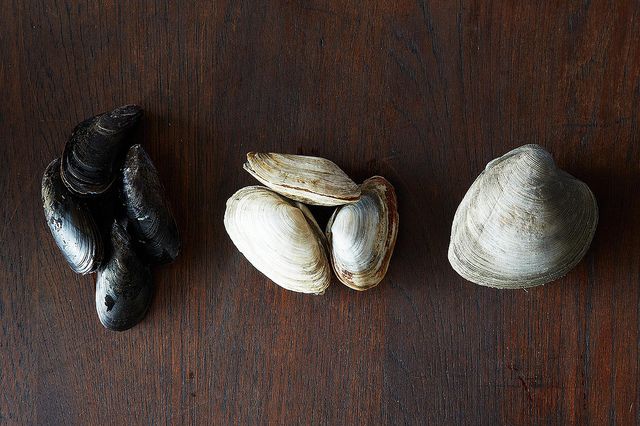
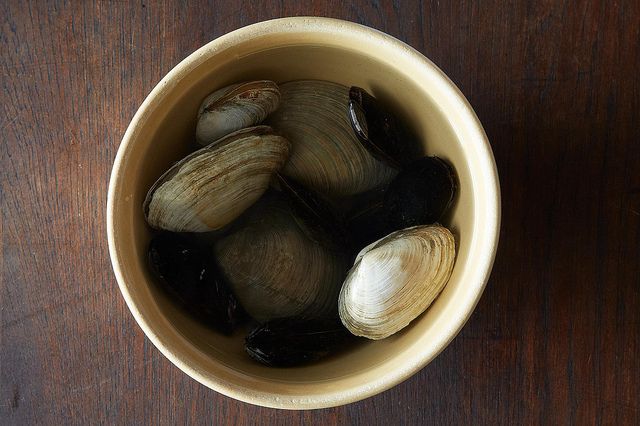
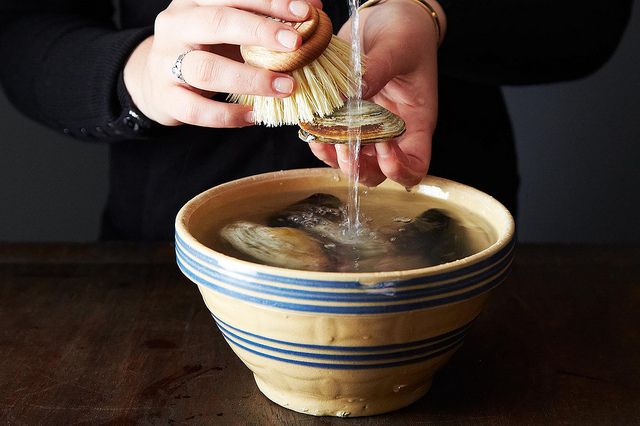
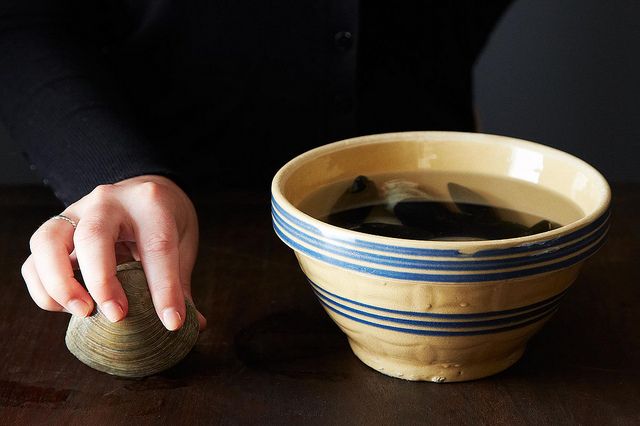
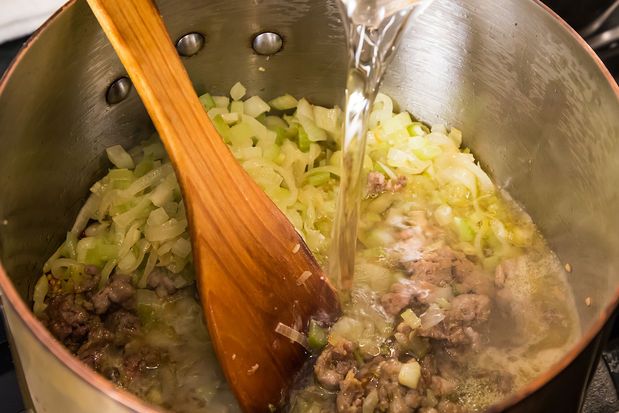
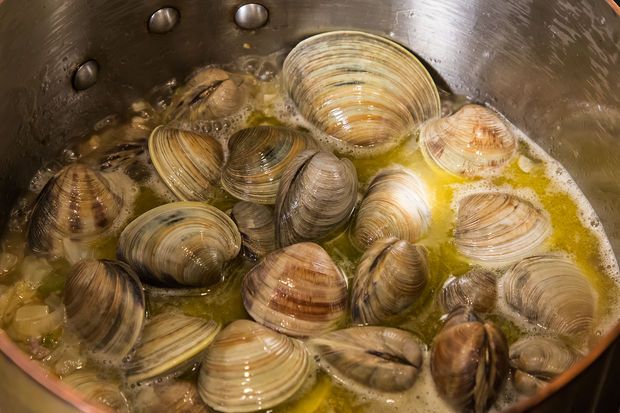
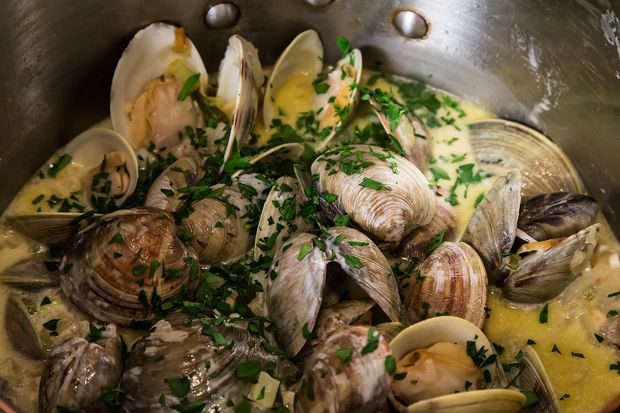
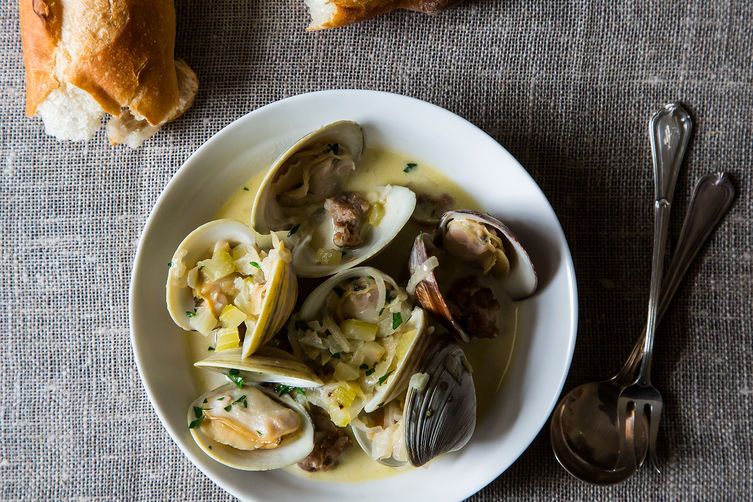

See what other Food52 readers are saying.